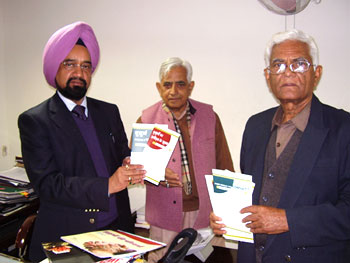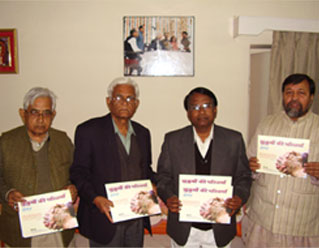(A venture of Indian Gerontological Association ) established by IGA in 2007.
Gerontological researches in India (Historical View)
India is the second country in the world having the highest population of aged. The rapid growth of the elderly population in India, with the wide diversity in their socio-economic conditions, rural-urban divide, gender differences, and the varied inter-related environmental influences need significant consideration by the researchers, policy planners, and service providers.
In the year 1978 the Information Exchange System on ageing was established by the Social development Branch, Center for Social Development and Humanitarian Affairs, Department of Economic and Social Affairs of United Nations, to monitor the present and prospective changes in the numbers and proportions of aged and their underlined demographic factors. This was planned for the purpose to maintain a system of collection and dissemination of information on ageing and to promote research at the international and national levels on topics of vital importance.
Indian Government, as the member country of United Nations, instructed the then department of Social welfare (now it is known as the Department of Social justice and empowerment) for collecting information on this issue and to communicate this information to the U.N. Social welfare department in association with the Education Department of Government of India prepared a bibliography- Ageing in India: An Annotated Bibliography (Edited by Saran Singh) in the year 1979. The bibliography enlisted total of 79 references of research articles from the year 1950 to 1978. The editor classified these papers into 5 categories: Demographic aspect (15 articles), economic aspect (21 articles), health aspect (9 articles), social aspect (26 articles), and psychological aspect (8 articles).
In another survey of Gerontological researches-Perspectives of Gero -Psychology in India: A review by P.V. Ramamurty and D. Jamuna, the authors classified the researches in different psychological aspects such as: problems of adjustment in old age, mental health and disability, life satisfaction, and its correlates, personality and its effect, index of aging and work efficiency, cognitive aspects, roles, activity, and disengagement, personality, rigidity, frustration, stress and coping, caring issues, social supports, spirituality, karma, and afterlife, personal futurity, psychological markers of happy aging, intergenerational perceptions, public perceptions, alienation and loneliness, gender issues in aging, elder abuse, studies on centenarians and models of longevity and welfare of the elderly and policy.
This survey was published in Indian Psychological Abstracts and Reviews (ICSSR's publication, Vol.2, No.2, July-December 1995)
Gerontology is a multidisciplinary scientific study of ageing and the problems of the aged. To date gerontology in India is considered as a problem not a separate subject of study, unlike developed countries. Hardly two or three universities have started a P.G. level course in gerontology. Not only has this only Madras medical college given M.D. degree in geriatrics. Similarly in B.Sc. nursing geriatric care is only a topic in a paper. Geriatric care is not a full paper in any nursing courses (U.G. or P.G. courses) in Nursing.
The topics of research in gerontology are varied types but hardly a few studies were conducted on the basic issues (in various related to gerontological issues) in India.
In a joint project of the United Nations Programme on Ageing and the International Association of Gerontology and Geriatrics in the year 2007 prepared "A research Agenda on Ageing for the 21st Century".
The Research Agenda on Ageing consists of four sections: Major Priorities; Critical Research Areas; Key Methodological Issues; and Implementation. The major priorities and the critical research areas described in these sections are linked to the Priority Directions of the Madrid International Plan of Action on Ageing.
Keeping in mind all these information Indian gerontologists should also prepare their agenda. In the preparation of the Indian agenda of research, it is expected to consult the agenda given by the Madrid International Plan of Action on Ageing.
Context
The Research Agenda on Ageing for the Twenty-First Century was designed to support the implementation of the Madrid International Plan for Action on Ageing, adopted by the Second World Assembly on Ageing (8-12 April 2002, Madrid, Spain). The Research Agenda identifies priorities for policy-related research and data collection. Simultaneously, it encourages researchers to pursue studies in policy-related areas of ageing where the findings may have practical and realistic applications The Research Agenda on Ageing is addressed to legislatures, governments, and academia, as well as non-governmental organizations and aid agencies dealing with issues of population and individual aging. It is based on recognition of the diversity in societies at different levels of demographic, social, and economic development.
JIGRT organizes various academic activities.
JIGRT Launches Its New Book
 |
| READ NOW |
Mr. G.S.Sindhu Principal Secretary, Department of Medical and Health, Government of Rajasthan, Jaipur is releasing the two brochures- When Should You CONSULT ? and When Someone Close To You Is Dying.

Two pamphlets : Care giver Abuse Screen and Indicators of Abuse were also released by him
 |
 |
| WHEN SHOULD YOU CONSULT | WHEN SOMEONE CLOSE TO YOU IS DYING |
Write to the Secretary for Free Copies of These publications Of JIGRT
Care of Elderly Calendar 2010
 |
 |
The calendar was released on January 1st, 2010 by Shri. Ram Kishore Saini, State Minister for Social Justice and Empowerment Government of Rajasthan Jaipur.
At This occasion Dr. K.L.Sharma, Secretary of Indian Gerontological Association, Shri Satnaryan Singh (IAS Retired), and Shri Satyan Chaturvedi, co-coordinator ECAT were also present.





